 Petzlover
Petzlover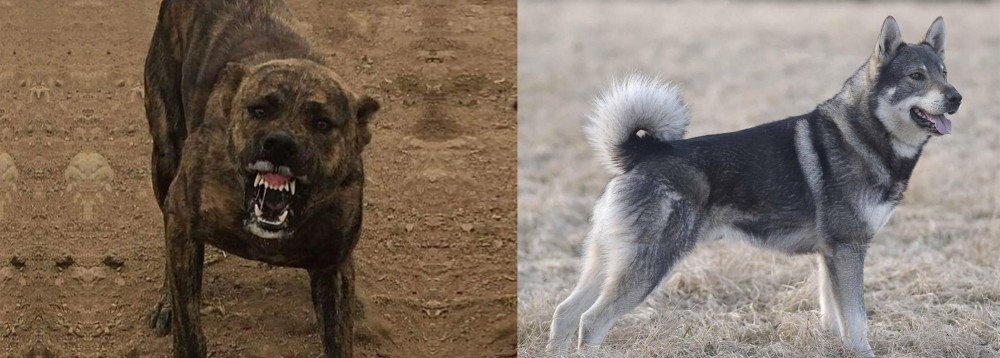 Dogo Sardesco is originated from Italy but Jamthund is originated from Sweden. Both Dogo Sardesco and Jamthund are having almost same height. Dogo Sardesco may weigh 10 kg / 23 pounds more than Jamthund. Both Dogo Sardesco and Jamthund has almost same life span. Both Dogo Sardesco and Jamthund has same litter size. Dogo Sardesco requires Low Maintenance. But Jamthund requires Moderate Maintenance
Dogo Sardesco is originated from Italy but Jamthund is originated from Sweden. Both Dogo Sardesco and Jamthund are having almost same height. Dogo Sardesco may weigh 10 kg / 23 pounds more than Jamthund. Both Dogo Sardesco and Jamthund has almost same life span. Both Dogo Sardesco and Jamthund has same litter size. Dogo Sardesco requires Low Maintenance. But Jamthund requires Moderate Maintenance
 This is an ancient working dog breed which hails from the Italian island of Sardinia. When you do research, you find that no one is sure as to this dogs exact origin, and there are a number of theories as to how the dog developed.
This is an ancient working dog breed which hails from the Italian island of Sardinia. When you do research, you find that no one is sure as to this dogs exact origin, and there are a number of theories as to how the dog developed.
Regardless of how the Dogo Sardesco came about, it is a valued companion of farmers in Sardinia, being appreciated for its protective nature.
The dog is a kind of Molosser or Mastiff dog. In the past the dog has been used as a working and hunting dog, and today he is a popular dog in mainland Italy. He is also known as Sardinian Mastiff, Sardinian Molosser and Dogo Sardo.
The Dogo Sardesco isn’t recognized today by international kennel clubs, and breeders on the island of Sardinia have done nothing to form a breed club for the dog.
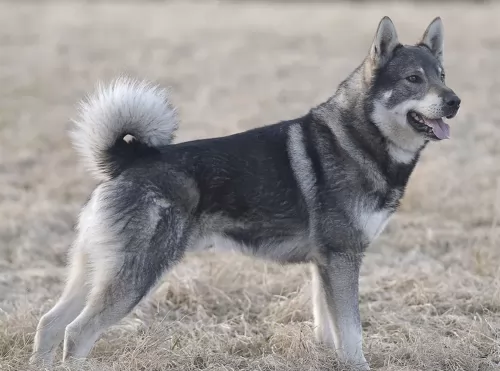 Known also as the Swedish Elkhound or Swedish Moosehound, the Jämthund is a dog which hails from Sweden, and more specifically from a region known as Jamtland.
Known also as the Swedish Elkhound or Swedish Moosehound, the Jämthund is a dog which hails from Sweden, and more specifically from a region known as Jamtland.
The dog received official recognition in 1946 as a dog breed from the Swedish Kennel Club. DNA testing tell us that these dogs originated from the crossing of a wolf, being described as a ‘Spitz-type dog’.
They were once used to pull sleds, and its why today he is an energetic dog, requiring a good dose of exercise and activities from his owners. The UKC accepted the dog as an official breed in 2006.
 The dog Sardesco is a medium to large sized dog generally measuring 56 to 68 cm at the withers and weighing roughly 30 to 45 kg.
The dog Sardesco is a medium to large sized dog generally measuring 56 to 68 cm at the withers and weighing roughly 30 to 45 kg.
Because the dog isn’t bred to specific standards, it varies in appearance, but it is a powerful looking dog, being lean and athletic. The dog’s tail is traditionally docked, but with tail docking being frowned upon, the tail is left long and the dog loses its distinctive look.
The head of the dog is large and the ears are also traditionally cropped to be very short. Left naturally, the ears fold down closely to the sides of the head.The eyes are small and amber colored. The coat is short and smooth, but thick, and while it comes in many colors, the more regular color is red, brown, black, grey or brindle.
The Dogo Sardesco becomes a loyal family pet, more so when he has been trained and socialized. Although he is a devoted and affectionate dog, forming particularly strong bonds with his human family, he isn’t recommended for homes where there are young children.
He also doesn’t take too kindly to other pets in the home. This is because they are a strong-willed, dominant breed and might therefore not be a good choice for first-time dog owners.
Because Sardinian breeders have focused on developing an aggressive dog, he has become a dog suspicious of- and aloof with strangers. He is stubborn and self-willed, and to make him more obedient and amicable, he will require training and socialization. He is an alert, intelligent dog and this makes him an excellent watch dog.
The Sardinian Mastiff is an active dog too and won’t do well in a home where the people aren’t interested in exercise. He is the kind of dog that will need to be taken with you on walks, and he will love to spend time running alongside you when you go running or cycling.
He won’t adapt too well to life in the city, particularly when there is just a tiny garden.
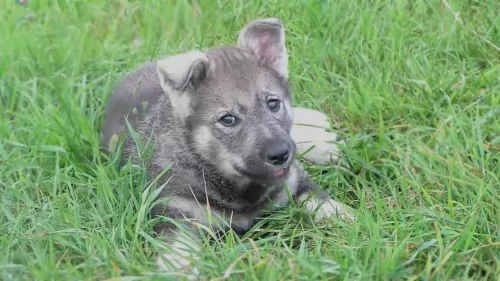 Described as a medium to large sized dog, the Jamthund stands at about 52 – 65cm in height, both males and females, and they weigh in at about 25 to 35 kilograms.
Described as a medium to large sized dog, the Jamthund stands at about 52 – 65cm in height, both males and females, and they weigh in at about 25 to 35 kilograms.
They have that typical Spitz-dog tail which curls over the back of the dog. When relaxed the tail hangs straight down. He has erect ears with a longish muzzle, much like a wolf, and his double coat lies fairly close to the body while on certain areas of the body, such as around the neck and tail, it is longer.
The color of his coat is usually light or dark grey with some cream marking around the muzzle, eyes, legs and paws. This fairly large, Spitz-type dog is certainly an attractive dog that while looking similar to a wolf shares some physical features with the Norwegian Elkhound.
Capable of being a splendid family pet, the Jamthund is an affectionate, loyal dog with his human family, although it is true that some of him hankers back to his hunting days.
He is an intelligent, amicable dog, and therefore training and socializing him is easy as he wants to please.
He is very energetic and won't be content with a life curled up indoors. He wants to be busy and involved with all your activities such as walks, hikes and swimming. He has a thick coat and he loves wintry weather, so the cold won’t stop him from wanting a long walk every day.
 The Dogo Sardesco has always performed his role as a working dog well, and this is a reliable watch dog as well as the dog takes his job of guarding his human family seriously.
The Dogo Sardesco has always performed his role as a working dog well, and this is a reliable watch dog as well as the dog takes his job of guarding his human family seriously.
With his aggressive temperament, he has appeared on the list of banned breeds, and this is why he isn’t an ideal choice for homes where there are small children, as some small children haven’t been taught how to treat a dog with respect.
However, when properly trained and socialized he becomes an excellent companion dog. He has an intimidating look about him, but when he is with his human family, another side comes out and he is affectionate, loving and protective.
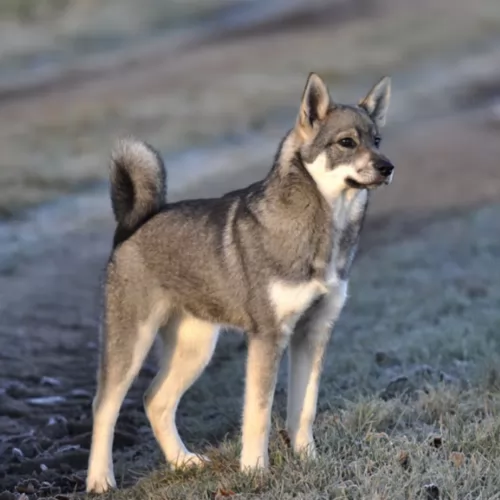 Loving the company of his human family, the Jamthund gets lonely, bored and frustrated if he is put into the backyard as a watchdog and left. When he becomes naughty it is because he is trying to tell you that he wants to be part of your life.
Loving the company of his human family, the Jamthund gets lonely, bored and frustrated if he is put into the backyard as a watchdog and left. When he becomes naughty it is because he is trying to tell you that he wants to be part of your life.
The Jämthund has excellent hunting skills and with his great intelligence too and his ability to learn easily, he makes a popular pet. He also has other attractive characteristics such as being brave and calm.
He forms a deep bond with his human family and his gentle nature makes him a favorite playmate of children too. They make good guard dogs as they are alert and protective of their human family.
Not only has the Jamthund got many positive characteristics to his name, he is an attractive dog too, and once you've brought one into your home you'll realize what a wonderful dimension it brings into your home and your life.
 The Dogo Sardesco is a relatively healthy breed who is unlikely to suffer with ailments common to dogs, but nonetheless there are some diseases or conditions that you might want to be aware of with your dog.
The Dogo Sardesco is a relatively healthy breed who is unlikely to suffer with ailments common to dogs, but nonetheless there are some diseases or conditions that you might want to be aware of with your dog.
Skeletal and visual problems can occur in this breed. Both hip- and elbow dysplasia are common orthopedic disorders in dogs and they can cause a lot of pain and discomfort and even cause lifelong disability.
Genes and environmental factors play a part in your dog developing this disease.If he has been diagnosed as having hip or elbow dysplasia, get your dog to the vet as there are treatments which can at least make your pet a lot more comfortable.
Remember that feeding your puppy Dogo Sardesco too much food which is particularly high in calories can mean him growing too fast, and this can contribute to this hip dysplasia problem.
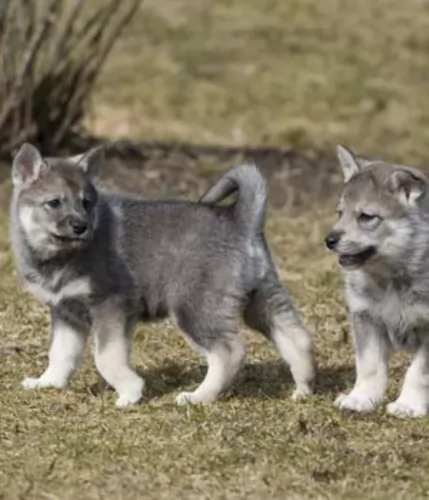 While the Jämthund is a healthy dog breed and won't cost you much in veterinary bills when it comes to illness, there are some common dog illnesses that are worth knowing about so you can respond in time to his need.
While the Jämthund is a healthy dog breed and won't cost you much in veterinary bills when it comes to illness, there are some common dog illnesses that are worth knowing about so you can respond in time to his need.
Unfortunately this is a joint problem that can affect even young dogs. The hip joint hasn't formed properly and it can lead to the development of painful arthritis. It can be a debilitating disease for your dog and you will need to see your vet.
This may seem like a trivial kind of dog illness but in fact it can lead to a lot of frustration, pain, anguish and discomfort for your pet. Signs of a skin allergy can include red, inflamed skin, itchiness, pain and oozing sores where your pet licks away miserably at the affected areas.
 Dog owners who don’t like the idea of spending too much money on grooming will appreciate that the Dogo Sardesco is a very low maintenance breed, and that a good brushing twice a week will keep the dog’s coat shiny and healthy.
Dog owners who don’t like the idea of spending too much money on grooming will appreciate that the Dogo Sardesco is a very low maintenance breed, and that a good brushing twice a week will keep the dog’s coat shiny and healthy.
As with all other dogs, he will need to have his teeth brushed to remove plaque build up. Not only does plaque lead to dental disease, but bad teeth can lead to other health issues too.
Nail clipping will also be necessary if your pet doesn’t wear the nails down naturally from getting to run on a hard surface from time to time.
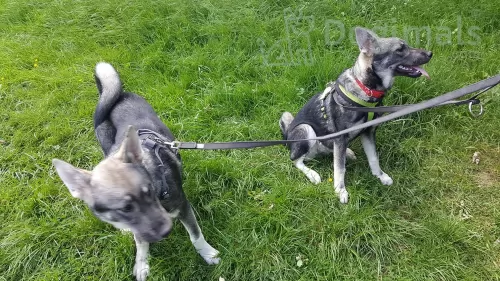 Your Jamthund is a high energy dog and because of his background of hunting and pulling sleds, he loves wide open spaces where he can run. He essentially suits country life and it wouldn't be wise to confine this energetic dog to a small home.
Your Jamthund is a high energy dog and because of his background of hunting and pulling sleds, he loves wide open spaces where he can run. He essentially suits country life and it wouldn't be wise to confine this energetic dog to a small home.
Brushing the thick coat twice a week will keep it in top condition.Keep his nails trimmed and also keep an eye on his teeth. Find out how to make use of canine toothbrush and toothpaste to keep his teeth clean and free of plaque.
Such a high energy dog requires the very best food packed full of vitamins and minerals. Look for the best commercially manufactured food there is and add in some wholesome home-made food from time to time such as cooked chicken, rice and vegetables as well as some raw meat occasionally. He must have a constant supply of fresh, cool water.